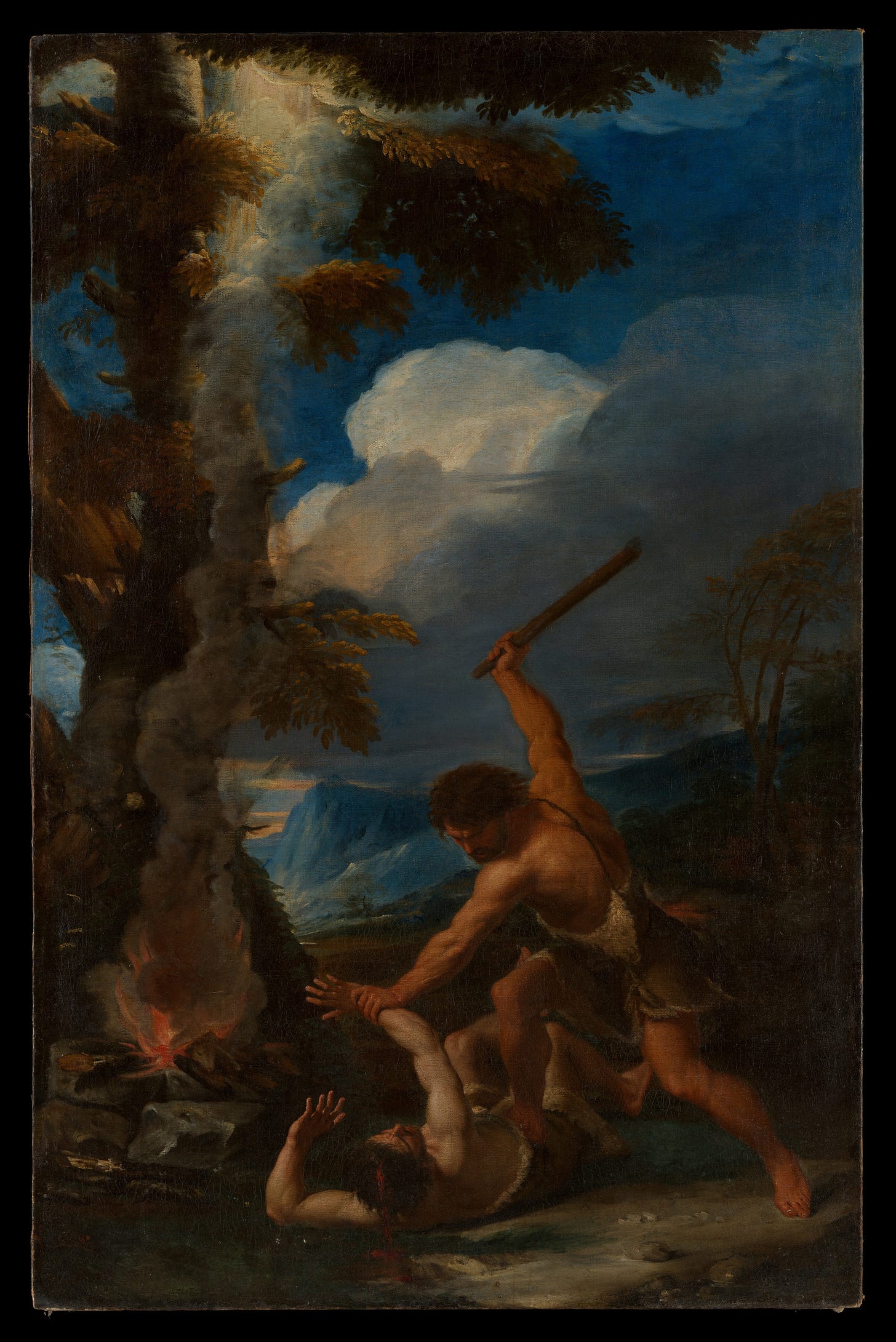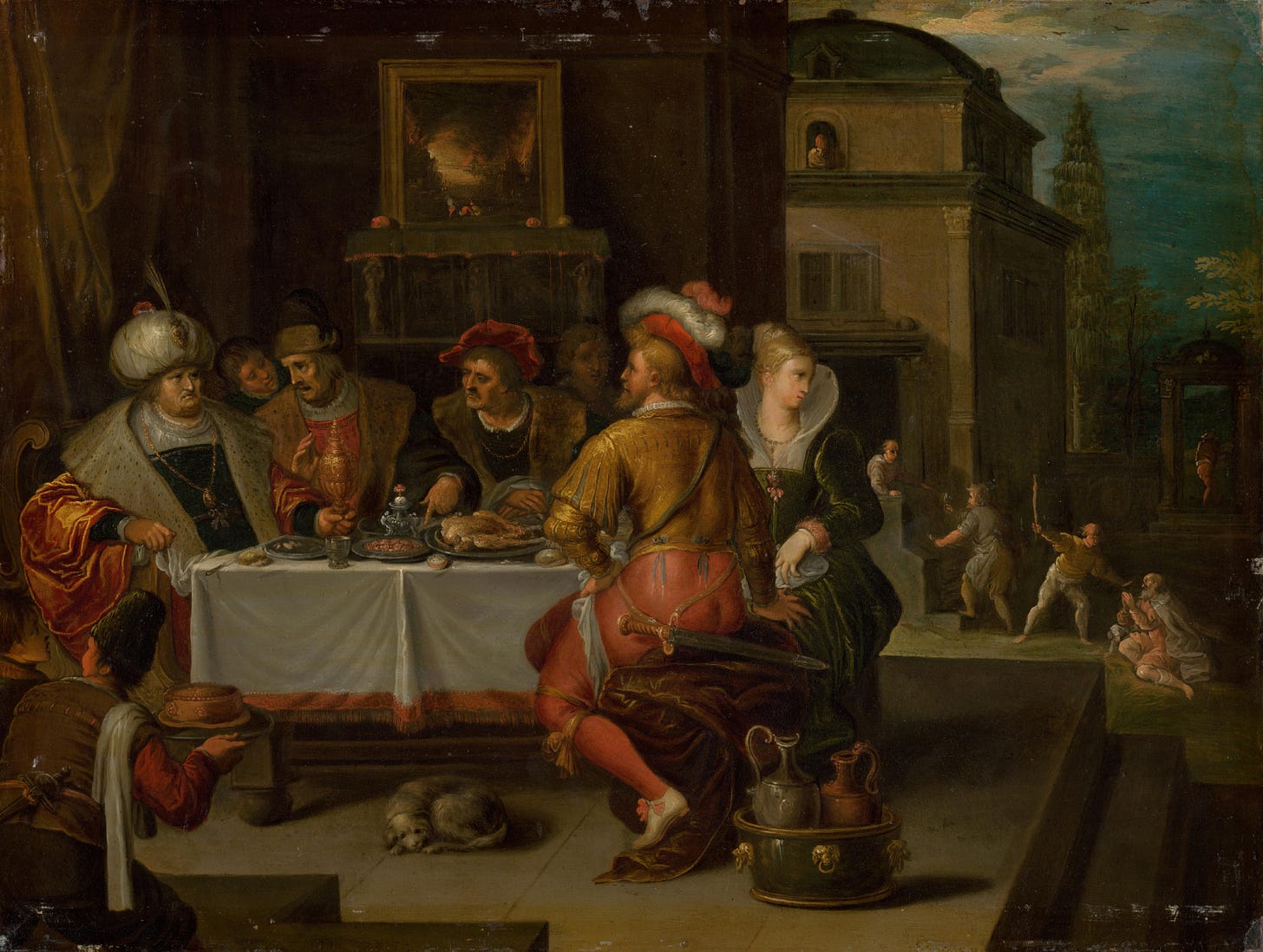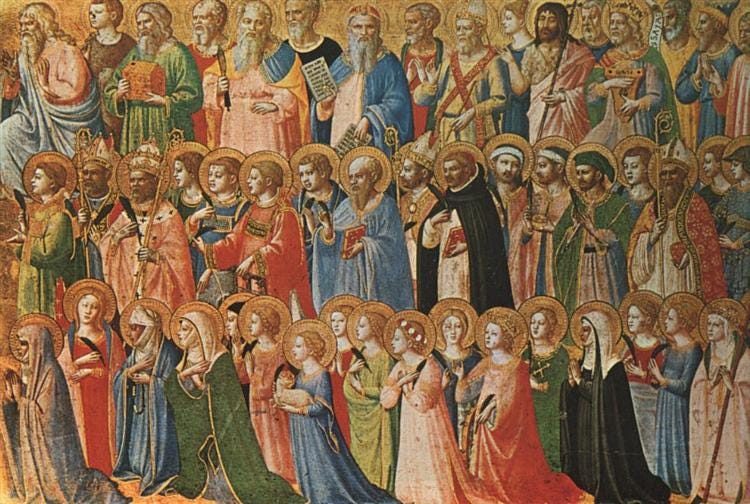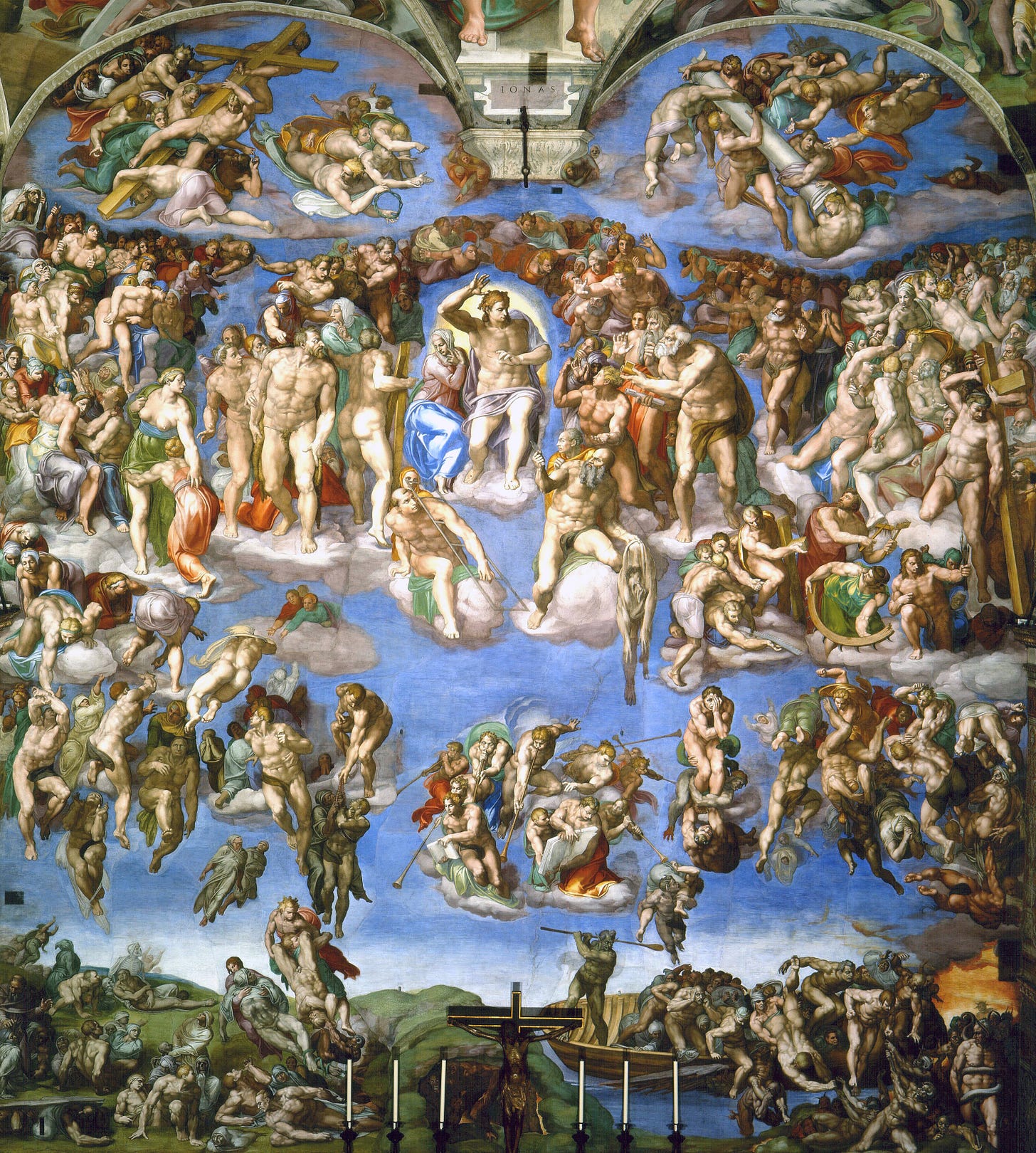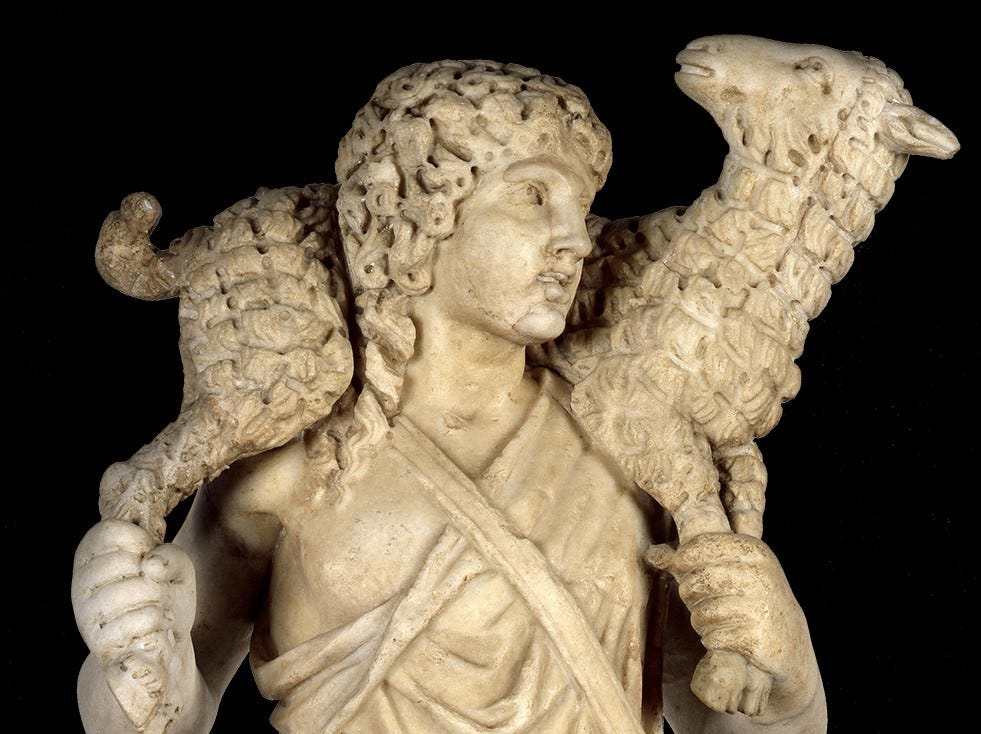Rawpixel: Pier Francesca Nola, Cain slaying Abel.
Verse 11
Juste judex ultionis,
donum fac remissionis
ante diem rationis
+
Just yet vengeful judge,
grant me the gift of pardon
before the day of reckoning.
No matter how we translate the first line of this verse we cannot escape the difficulty of the description of the just judge as ‘vengeful’ (‘just yet vengeful judge’). Perhaps the key to this is to be found in the letter to the Romans which appears to make the bluntest claim in favour of vengeance. ‘Vengeance is mine, says the Lord’ (12.19). The context, however, makes it clear that there is no place for revenge in the life of the Christian. Part of the legacy of the fall from grace is a desire to take revenge and is paraded in its most extreme form in Lamech’s boastful song:
Cain’s revenge is sevenfold
then Lamech’s is seventy-seven fold (Genesis 4.24).
When asked by Peter how often he should forgive his brother if he offended him, as often as seven times? Jesus reversed Lamech’s vengeful boast: forgive him not seven times but seventy times seven (Matthew 18.22).
That this temptation is to be resisted at all costs is an essential element in Jesus’ teaching. The great reconciliation sermon, preserved by Matthew, ends with the parable of The Unforgiving Servant (Matthew 18.21-31). The parable is really an illustration of one of the petitions of the Lord’s Prayer: Forgive us our trespasses as we forgive those who trespass against us (Matthew 5.12). In the light of this parable a more precise translation into English of this petition might be: Forgive us our trespasses if we forgive those who trespass against us. Some years ago, a wayside pulpit caught my attention with the following banner headline: Trespassers will be welcomed!
Rawpixel: The Expulsion From the Garden of Eden by Masaccio
Verse 12
Ingemisco, tamquam reus:
Culpa rubet vultus meus:
Supplicanti parce, Deus.
+
I groan like one condemned:
Guilt brings a blush to my face:
Pardon one who appeals to you, O God.
Adam and Eve had been ‘naked yet unashamed’ before their fall from grace (Genesis 2.23). One of the immediate effects of their sin was a sense of shame and embarrassment. To that extent they would be very different from future generations of sinners who, more and more, would lose or abandon any sense of shame. Remember Cain’s brazen reply to the Creator when challenged about his brother’s whereabouts: ‘Am I my brother’s keeper?’ In marked contrast, our poet makes no secret of his shame. How could he when it is written all over his face? Surely his shame will argue before his judge for leniency (Guilt brings a blush to my face).
Rawpixel: The Penitent Magdalen, Georges de La Tour.
Verse 13
Qui Mariam absolvisti,
et latronem exaudisti,
mihi quoque spem dedisti.
+
You who absolved Mary,
and listened to the prayer of the thief,
to me too you have given hope.
Two repentant sinners are singled out from the Gospel tradition as a sign of hope for every penitent. Mary Magdalen is mentioned by name and by implication at key moments in Jesus’ life. He expelled seven demons from her and with several other women she then accompanied him on his way to Jerusalem. She was among the witnesses to the crucifixion and to Jesus’ burial (Matthew 27.61) and is counted among the first to find the empty tomb and spread the Good News (Matthew 27.56).
The repentant thief is also remembered as a prime example of Jesus’ compassion. Indeed, Jesus’ final words are addressed to this most destitute and despised of men but one who found it in his heart to admit and regret his sins: ‘This day you will be with me in paradise’ (Luke 24.23). Although our Sequence speaks at length of the dark side of life, it ends on a triumphant note. ‘Mihi quoque spem dedisti / To me too you have given hope’.
Verse 13 rises high above the darkness of sin and guilt to shine a light on pardon and reconciliation. Jesus’ last words are enough to extinguish even the flames of hell fire.
Rawpixel: The Rich man and Lazurus, Franz Francken II.
Verse 14
Preces meae non sunt dignae:
Sed tu bonus fac benigne,
ne perenni cremer igne.
+
My prayers are not worthy:
Yet in your goodness treat me kindly,
lest I burn in everlasting fire.
The last line, ‘lest I burn in everlasting fire’ confronts us bluntly with a thought that has been present since the very beginning of the Sequence, hell fire. In this verse, a further dimension is added to the image; hell fire is everlasting (ne perenni cremer igne / lest I burn in everlasting fire). Every generation, including our own, has difficulty with the very idea of the existence of hell fire. Jesus’ teaching leaves us little room for doctrinal manoeuvres. We might just get our heads round the concept of the burning pain of loss. The very thought of separation forever from the love of family and friends is painful enough. The thought of separation forever from the love of God is devastating.
One of the most convincing arguments for this is surely Jesus’ parable of The Rich Man and Lazarus (Luke 16.20). In this parable Jesus pressed to the limit a truth to which he returned time and time again: neither sin nor grace can be grasped in themselves. Their presence is, however, revealed where there is distance and separation. Wherever there is hostile separation between individuals or between larger groups of people there is some deep evil at work. No disease can be examined directly but its presence is evidenced by the symptoms its displays. The principal symptom of the presence of sin and evil is separation and distance and here distance is not to be measured in miles.
While all four evangelists are familiar with this teaching of Jesus, Saint Luke, in a special way, gives it prominence. The three parables of his chapter 15 could hardly be more different from one another but they have one thing in common; unity that is lost for a time but eventually restored.
In each case the evil generated is the evil and sadness of loss. There can be no rejoicing till the woman repossesses the coin she had lost, till the shepherd carries his lost sheep back to the sheepfold and the prodigal and his elder brother cross the threshold of their father’s house hand in hand.
Verse 15
Inter oves locum praesta,
et ab haedis me sequentra,
statuens in parte dextra.
+
Among the sheep secure my place,
and from the goats shelter me,
by allowing me to stand at your right.
Verse 15 is also built round a saying of Jesus concerning separation; in this instance of sheep from goats on a final day of reckoning (Matthew 25.32).
Wikiart: Christ Glorified in His Court, Fran Angelico.
Verse 16
Confudatis maledictis,
flammis acribus adictis:
Voca me cum benedictis.
+
When evil men are left confused,
consigned to bitter pains:
Call me among the blessed.
In three lines and nine words our poet takes us to the heart of Jesus’ teaching on the greatest commandment, the love of God and our neighbour. The key words are quoted from ‘The Judgement of the Nations’ recorded by Matthew 25.1-46, a passage that equates the love of our neighbour with our love of God. The love of our neighbour authenticates our claim to love God and it is on this that we will finally be judged. The key words that bring Jesus’ teaching on the Kingdom of God to a close are ‘maledicti’ and ‘benedicti’ (damned and blessed).
Jesus anticipated the ‘confusion’ of those who failed to appreciate this and act accordingly. When you cared for one of the least of my brethren, you cared for me. The ‘maledicti’ of this verse had failed to act on this fundamental message. The ‘benedicti’ had acted. ‘And they will go into eternal punishment, and the blessed to eternal life’ (Matthew 25.46). ‘Jesus had now finished all he wanted to say’ (Matthew 26.1). On this note of finality Jesus concludes the last of his five sermons recorded by Matthew.
Rawpixel: A hermit in prayer, Rembrandt.
Verse 17
Oro supplex et acclinis,
cor contritum quasi cinis:
gere curam meae finis.
+
I pray on my knees,
with a contrite heart reduced to dust:
Care for me as I face my end
Our poem moves easily from external postures to deeper realities. The suppliant on his knees has already taken a step in the right direction as he adopts the posture of a penitent sinner. However, without a profound change of heart this external gesture makes little sense. ‘Unless you turn round and become like a little child you will not enter the kingdom of heaven’ (Matthew 18.1ff).
Jesus had reserved his most devastating criticism for scribes and Pharisees who were given to parading their virtue in public. They have had their reward. A contrite heart must lie deep within his being if he is to receive his reward for a good life: (a contrite heart reduced to ashes). How often Jesus commends this spiritual state in the face of so much hypocrisy and phariseeism.
Rawpixel: The Last Judgement, Michelangelo.
Verse 18
Lacrimosa dies illa,
qua resurget ex favilla
judicandus homo reus.
+
That will be a tearful day,
on which will rise from the ashes
mortal man to face his judge.
The two final verses represent a change in perspective, in mood and in metre and are believed by some commentators to be an addition to the poem to render it more apt for public worship. The immediately preceding verses were concerned with the fate of one individual, the poet himself. Verse 18 offers a résumé of the whole poem as it echoes the wording of the first verse – dies illa, ex favilla.
All mankind now arrives on the scene to face a Universal Judgement. He appeals to ‘Good Lord Jesus’ to forgive and grant them rest.
The Good Shepherd, Statuette in the Musei Vaticani.
Verse 19
Huic ergo parce, Deus:
pie Jesu Domine,
dona eis requiem. Amen.
+
Therefore spare such a one, O God:
blessed Jesus Lord,
give them rest. Amen.
Summary
Our powerful Sequence may have disappeared from public worship but it need not disappear from personal reflection on the four last things: death, judgement, hell and heaven. It makes no claims that are not already grounded in the Gospel, and deserves at least an occasional hearing, if not as food for thought at least as an example of the best of medieval Latin poetry.
Even in a pontificate, so full of joy and hope, there still remains a place for final judgement, a sense of regret, an awareness of the reality of sin and the equal reality of absolution. Fear of God is, of course, the beginning, not the end, of wisdom.
There is another Sequence of equal poetic and theological stature, Vexilla Regis. Although a literal translation of the first words would proclaim the ‘banners’ of the King, the poem concerns the greatest of them all, the Cross of the Risen Lord. After the conversion of Constantine, the Roman eagle blazoned on military banners would give way to the cross of Christ on the banners of onward Christian soldiers.
Vexilla Regis was composed by Venantius Fortunatus (530-609), which translates as Lucky Venantius. He was well named. His Sequence resonates with good fortune, positive thinking and even prosperity. However, in the spirit of Horace this Sequence will have to wait for the shade of a summer tree.
Written by Canon Foley
St Augustine’s Coatbridge has generously allowed us to reproduce some of the writing of the late Canon. If you want to read more of his writings please click here. St Augustine’s is also the home of Being Catholic TV, Scotland’s first Catholic TV channel.



